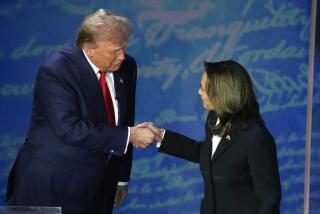‘Debate Over Debates’ Continues as First One Is Canceled
- Share via
WASHINGTON — The first debate of the 1992 presidential election was officially canceled Wednesday because the Bush campaign refused to accept the proposed format.
The debate was to be held Tuesday in East Lansing, Mich., with a vice presidential face-off to follow on Sept. 29, and two more presidential debates in October. Each was to be loosely structured with a single moderator.
The future of any debates is now unclear. President Bush has proposed only two, with a panel of journalists to ask questions. Democratic nominee Bill Clinton accepted the debate commission’s original proposal--which would require the candidates to confront each other more directly.
Analysts believe that Bush wants to debate, but only on his terms, and that Clinton may have something to gain by allowing the discussion to continue while his lead in the polls remains stable.
“We want to debate,” presidential Press Secretary Marlin Fitzwater said at the White House Wednesday. “We just believe that we should be sitting down with the Clinton campaign deciding what’s best for both candidates. . . . We believe we ought to have that control over our own destiny.”
The Clinton campaign saw it differently. “All we can conclude from this is that George Bush really does not want to debate,” said Clinton communications director George Stephanoupolos.
Clinton will go to Michigan Tuesday anyway and stage a town hall on statewide television.
In the last several weeks the two campaigns have engaged in a game of rhetorical cat and mouse over what has become known as “the debate over the debates.”
After James A. Baker III became the White House chief of staff last month, he made it clear that he would not accept the proposal by the Commission on Presidential Debates, which had sponsored the 1988 debates.
Earlier this month, Bush campaign chairman Robert M. Teeter sent the Clinton campaign a letter proposing the same format that was used four years ago. That called for two presidential debates and a single vice presidential debate. Rather than a single moderator only, it called for a moderator and a panel of three journalists to ask questions. The campaigns would agree which journalists would ask the questions.
Teeter also warned in the letter that if Clinton did not accept Bush’s terms by Friday, “we will assume you do not wish to debate.”
Clinton responded that he had accepted the commission proposal, and any negotiations should be in public, not behind closed doors.
In 1988, there was widespread criticism that the format now proposed by the Bush campaign resulted in not really a debate but a staged press conference. As this year began, the four television networks proposed instead a debate with little formal structure.
They suggested there be no live audience, no particular rules and one moderator. The debate commission, which is run by former national chairmen from both the Republican and Democratic parties, agreed to much of that idea, except that it wanted a live audience.
All of this might seem like minutiae, but both sides know it could alter the character of the debates, which historically have been the most important events in deciding presidential elections.
Most political analysts in both parties believe Bush prefers the more formal structure for three reasons. First, the journalists would ask Clinton the nasty questions that Bush otherwise would have to ask. Second, the journalist panel minimizes the sense that the President is standing as an equal with a challenger. Third, to the degree that Bush might feel at a disadvantage in debating Clinton, who did well in all of the primary-season debates, this is a format with which he, at least, is familiar.
The Clinton campaign’s position is less clear, analysts say. Although normally a challenger benefits from standing on stage with an incumbent in debates, some analysts now believe that Clinton, who is ahead by roughly 10 points in most opinion polls, faces greater risk by debating.
“Time is running out on Bush,” former Ronald Reagan Administration communications director David Gergen said. “He needs to change the underlying dynamics of the race. A strong victory in an opening debate might do it.”
Officially, the Clinton campaign has repeatedly said it wants to debate as soon as possible. In private, however, campaign aides say that with Clinton holding a large lead there is no great incentive to do so soon.
When asked recently why they would want to debate right away, Stephanoupolos smiled and said, “That’s a good question.”
More to Read
Get the L.A. Times Politics newsletter
Deeply reported insights into legislation, politics and policy from Sacramento, Washington and beyond. In your inbox twice per week.
You may occasionally receive promotional content from the Los Angeles Times.










